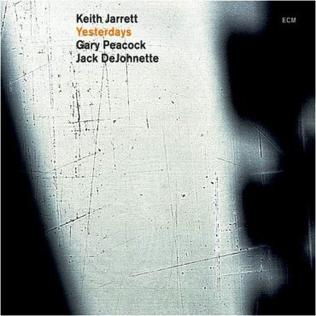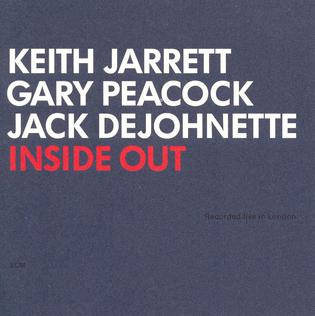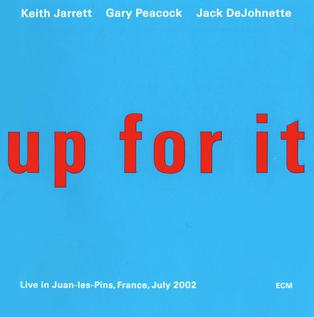
Keith Jarrett is an American pianist and composer. Jarrett started his career with Art Blakey and later moved on to play with Charles Lloyd and Miles Davis. Since the early 1970s, he has also been a group leader and solo performer in jazz, jazz fusion, and classical music. His improvisations draw from the traditions of jazz and other genres, including Western classical music, gospel, blues, and ethnic folk music.

Eyes of The Heart is an album by American pianist Keith Jarrett featuring his "American Quartet", made up of Jarrett himself, Dewey Redman, Charlie Haden and Paul Motian. It was recorded at the Theater am Kornmarkt, Bregenz in Austria in May 1976 and was released in 1979 by ECM Records. The studio album The Survivors' Suite had been recorded one month earlier.

Sun Bear Concerts is a live box set by American jazz pianist Keith Jarrett compiling five solo piano concerts performed over two weeks during his November 1976 tour in Japan and originally released by ECM as a ten-LP set in January 1978 and re-released in 1989 as a six-CD box set restoring encores from three of the concerts.

The Carnegie Hall Concert is a solo live double-album by the American pianist Keith Jarrett recorded at the Isaac Stern Auditorium of Carnegie Hall on September 26, 2005 and released on ECM September the following year.

Radiance is a double-album by American pianist Keith Jarrett recorded in October 2002 in Japan at two different concerts—Osaka and Tokyo —and released by ECM in May 2005. In April 2006, a video recording of the live performance at Tokyo concert was released as Tokyo Solo.

Paris / London: Testament is a live solo piano album by American pianist Keith Jarrett, recorded at the Salle Pleyel in Paris November 26, 2008 and the Royal Festival Hall in London the next week on December first, and released as a three CD set on ECM in October the following year.

Yesterdays is a live jazz album by Keith Jarrett, Gary Peacock, and Jack DeJohnette recorded in concert on April 30, 2001 at the Metropolitan Festival Hall in Tokyo and also at the sound-check recording of April 24, 2001 at the Orchard Hall in Tokyo that would give way to Always Let Me Go. It was released by ECM Records in 2009.

The Out-of-Towners is a live album by the jazz trio of Keith Jarrett, Gary Peacock, and Jack DeJohnette, recorded at the Bavarian State Opera in Munich on July 28, 2001 and released on ECM in August 2004.

Inside Out is a live album by Keith Jarrett's "Standards Trio," featuring Gary Peacock and Jack DeJohnette, recorded at the Royal Festival Hall in London on July 26 & 28, 2000 and released on ECM October the following year. Along with Changes (1983) and Changeless (1987), this was the trio's third album to feature mainly original improvised material.

Up for It is a live album by Keith Jarrett's "Standards Trio," featuring Gary Peacock and Jack DeJohnette, recorded at the Jazz à Juan festival in Juan-les-Pins, France, on July 16, 2002 and released on ECM Records May the following year, celebrating the trios 20th anniversary.

Jasmine is a 2010 duet album by American pianist Keith Jarrett and bassist Charlie Haden. It was released on 12 May 2010. The album was recorded in March 2007 at Jarrett's home studio in Oxford Township, New Jersey during the recording of a documentary about Haden. Additional tracks from the same session, including alternate takes of "Where Can I Go Without You" and "Goodbye", were released in 2014 on Last Dance.

Hymns/Spheres is a solo double album by Keith Jarrett recorded at the Benedictine Abbey in Ottobeuren, West Germany, September 1976 and released on ECM two months later in November. The album consists of improvisations on the massive Karl Joseph Riepp "Trinity" Baroque pipe organ, "the larger of the two Karl Joseph Riepp (1710–1775) organs at the Benedictine Abbey in Ottobeuren."

Invocations/The Moth and the Flame is a double album of improvised solo performances by Keith Jarrett recorded in October 1980 and November 1979 respectively and released on ECM in May 1981.

Sleeper is a double album by Keith Jarrett's "European Quartet" recorded on April 16, 1979 in Tokyo, and released on ECM 33 years later in 2012.

Fleuve is the second album credited to the Pierre Favre Ensemble, recorded in Switzerland in October 2005 and released on ECM October the following year—twenty two years after the ensemble's 1984 debut, Singing Drums, presenting a new line-up that departed from the previous incarnation's all-percussion sound. The septet now included harp, double clarinet, double bass, tuba, guitar, bass guitar, soprano saxophone, and serpent—an instrument rarely used in jazz.

Somewhere is a live album by Keith Jarrett's "Standards Trio," recorded in Switzerland on July 11, 2009 and released on ECM in May 2013.

Last Dance is an album by American pianist and composer Keith Jarrett and American jazz double bass player Charlie Haden—long-term collaborators—recorded at Jarrett's home studio in March 2007 and released on ECM in June 2014 containing outtakes and two alternate takes from Jasmine, released four years previously.

La Fenice is a live solo album by Keith Jarrett recorded at the Teatro La Fenice in Italy on July 19, 2006 and released on ECM 12 years later, in October 2018. According to ECM, its release was "timely" as the 62nd International Festival of Contemporary Music of the 'Biennale di Venezia' honoured Keith Jarrett with its Golden Lion for Lifetime Achievement.

Munich 2016 is a live solo double-album by American pianist and composer Keith Jarrett recorded at thePhilharmonic Hall in Munich on July 16, 2016 and released on ECM in November 2019.

Setting Standards: New York Sessions is a three-CD compilation album by the Keith Jarrett Trio, featuring Jarrett on piano, Gary Peacock on bass, and Jack DeJohnette on drums. It brings together the contents of Standards, Vol. 1 (1983), Changes (1984), and Standards, Vol. 2 (1985), all of which were recorded for ECM Records at the Power Station in New York City during January 11–12, 1983. Setting Standards was released by ECM in 2008 to mark the 25th anniversary of the trio.




















